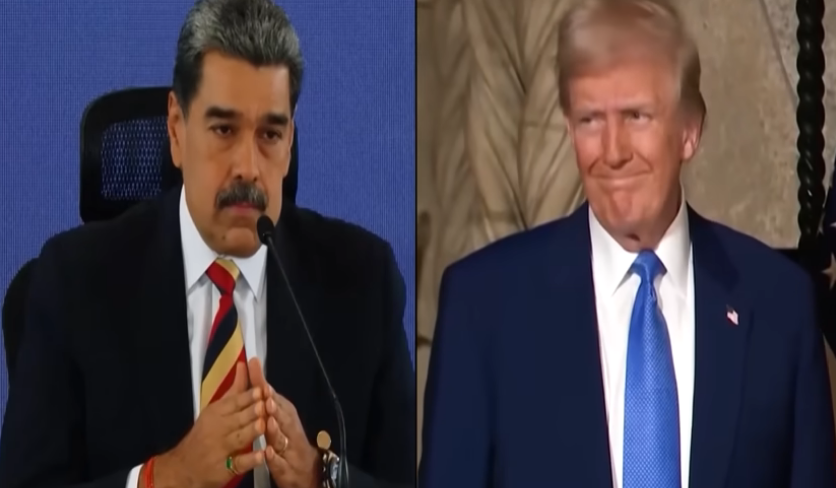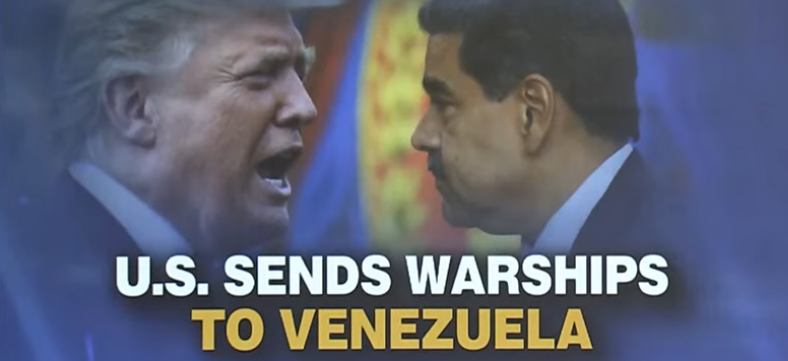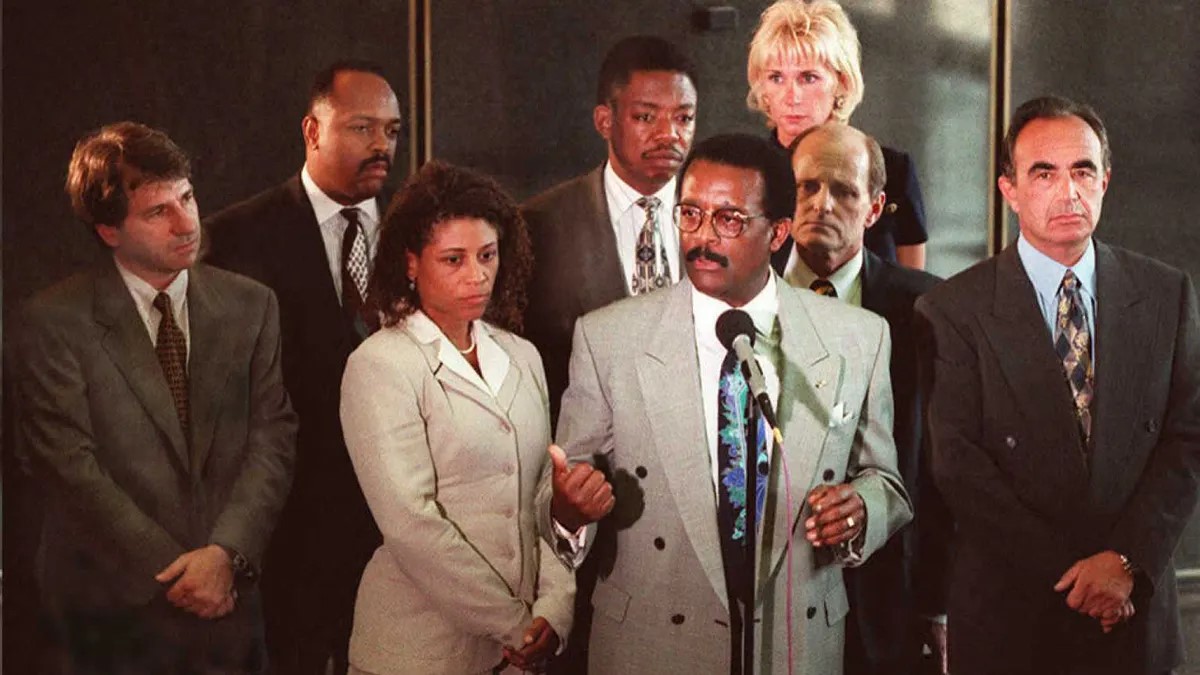Wag The Dog: Will Trump Now Attack Venezuela To Distract From Epstein Crisis And Domestic Scandals?
By Mel Gurtov Photos: YouTube Screenshots Analysis of why countries go to war sometimes argues that leaders are motivated by problems at home. They attack another country to divert attention from an economic crisis, an unlawful act, or—as in the Robert De Niro movie, Wag the Dog—a sex scandal. In recent years, for example, Israel’s all-out response to the Hamas attack in October 2023 might be explained as having been prompted by Prime Minister Benjamin Netanyahu’s political and legal troubles. India’s brief war with Pakistan in May may have occurred to release domestic political pressures in both countries. These explanations may be off the mark, but they appear regularly in speculation about why political leaders decide to fight rather than negotiate. Trump’s Deep Troubles at Home Now, as Pres. Trump considers what to do with his Caribbean armada and Venezuela’s “narco-terrorist” leader, Nicolas Maduro, we may be witness to another wag-the-dog event: US military pressure on Venezuela that could lead to a direct attack if Maduro doesn’t step down. The case for Trump to be highly motivated to act out of self-interest is strong. Consider: · His approval ratings are very low and declining by the week—around 36 percent in overall approval, with even lower ratings on his handling of the economy, tariffs, and the government shutdown. · His economic policies have led to food and health care inflation, declining consumer confidence, a very large population living from paycheck to paycheck, and considerable grumbling among corporate leaders. Trump is now flailing about for a response, such as $2,000 direct payments to families and lower tariffs on food imports, that will assuage people’s growing anger. It’s desperation time. · The Epstein case is about to explode in Trump’s face. Republicans are defecting in droves on a vote to demand the release of all government files on Epstein. It is already clear that Trump, Attorney General Pam Bondi, and others in Trump’s circle have lied about the Trump-Epstein relationship. Trump’s order to Bondi to prosecute his political enemies and investigate Democrats who knew Epstein will probably do little to displace the Trump-Epstein story. · The stark corruption in and around the White House is a sharp contrast with rising economic inequality. Trump’s crypto currency ventures, the East Wing demolition, the glitzy White House parties, the Argentina bailout, the Middle East hotel projects—these are all bad optics, as the spin doctors would say. · A blue tide is emerging: the Democrats are getting traction on Epstein, “affordability,” and incompetence in Trump’s cabinet. 2026 doesn’t look promising. · Judges around the country are ruling against National Guard deployments to cities and brutal ICE tactics against immigrants and citizens. Why Not Venezuela? As Trump looks around for an off-ramp, preparing for an attack on Venezuela surely has come to mind. After all, he and Pete Hegseth have assembled an enormous force in the Caribbean that goes far beyond any counter-drug operation. Hegseth has reinforced the mission’s importance by giving it a name–Operation Southern Spear. What better way to showcase the war on drugs than to use all that firepower and score a dramatic win against a second-rate Venezuelan army? Trump has also lined up the legal argument, thanks to Bondi. As the New York Times has reported, the justice department’s legal counsel has given Trump precisely the justification he cites for attacking alleged drug boats, namely, that the US in engaged in armed conflict against the drug cartels and “narco-terrorism.” By that argument, taking the fight to its source must also be legal. And since the President has made a “determination” as to the national security implications, presumably there is no need to consult with or obtain the consent of Congress. Trump’s way of dealing with foreign affairs further lends itself to the wag-the-dog possibility. Self-interest comes first, the consequences of aggressive actions last. What to do about Venezuela is above all a personal issue, just as the Gaza peace plan, the war in Ukraine, and the eight other wars Trump has resolved are personal triumphs. He may pretend to be consulting with military leaders about options in Venezuela, but does he really care what they say? They are interested in strategy and the national interest, not in protecting him and his regime. Only Trump can protect Trump. To be clear, wag-the-dog explanations are alluring, but rarely persuasive. It is all too easy to assign domestic troubles as the reason for a foreign adventure, since all countries have economic, political, or social problems at a given moment. Authoritarian rule in Venezuela provides a convenient, well-used pretext for US action. Maduro’s regime is “illegitimate”; Venezuela’s oil wealth can be taken; drug cartels in Mexico, Colombia, and elsewhere can be pu

By Mel Gurtov
Photos: YouTube Screenshots
Analysis of why countries go to war sometimes argues that leaders are motivated by problems at home. They attack another country to divert attention from an economic crisis, an unlawful act, or—as in the Robert De Niro movie, Wag the Dog—a sex scandal. In recent years, for example, Israel’s all-out response to the Hamas attack in October 2023 might be explained as having been prompted by Prime Minister Benjamin Netanyahu’s political and legal troubles. India’s brief war with Pakistan in May may have occurred to release domestic political pressures in both countries. These explanations may be off the mark, but they appear regularly in speculation about why political leaders decide to fight rather than negotiate.

Trump’s Deep Troubles at Home
Now, as Pres. Trump considers what to do with his Caribbean armada and Venezuela’s “narco-terrorist” leader, Nicolas Maduro, we may be witness to another wag-the-dog event: US military pressure on Venezuela that could lead to a direct attack if Maduro doesn’t step down. The case for Trump to be highly motivated to act out of self-interest is strong. Consider:
· His approval ratings are very low and declining by the week—around 36 percent in overall approval, with even lower ratings on his handling of the economy, tariffs, and the government shutdown.
· His economic policies have led to food and health care inflation, declining consumer confidence, a very large population living from paycheck to paycheck, and considerable grumbling among corporate leaders. Trump is now flailing about for a response, such as $2,000 direct payments to families and lower tariffs on food imports, that will assuage people’s growing anger. It’s desperation time.

· The Epstein case is about to explode in Trump’s face. Republicans are defecting in droves on a vote to demand the release of all government files on Epstein. It is already clear that Trump, Attorney General Pam Bondi, and others in Trump’s circle have lied about the Trump-Epstein relationship. Trump’s order to Bondi to prosecute his political enemies and investigate Democrats who knew Epstein will probably do little to displace the Trump-Epstein story.
· The stark corruption in and around the White House is a sharp contrast with rising economic inequality. Trump’s crypto currency ventures, the East Wing demolition, the glitzy White House parties, the Argentina bailout, the Middle East hotel projects—these are all bad optics, as the spin doctors would say.
· A blue tide is emerging: the Democrats are getting traction on Epstein, “affordability,” and incompetence in Trump’s cabinet. 2026 doesn’t look promising.
· Judges around the country are ruling against National Guard deployments to cities and brutal ICE tactics against immigrants and citizens.

Why Not Venezuela?
As Trump looks around for an off-ramp, preparing for an attack on Venezuela surely has come to mind. After all, he and Pete Hegseth have assembled an enormous force in the Caribbean that goes far beyond any counter-drug operation. Hegseth has reinforced the mission’s importance by giving it a name–Operation Southern Spear. What better way to showcase the war on drugs than to use all that firepower and score a dramatic win against a second-rate Venezuelan army? Trump has also lined up the legal argument, thanks to Bondi. As the New York Times has reported, the justice department’s legal counsel has given Trump precisely the justification he cites for attacking alleged drug boats, namely, that the US in engaged in armed conflict against the drug cartels and “narco-terrorism.” By that argument, taking the fight to its source must also be legal. And since the President has made a “determination” as to the national security implications, presumably there is no need to consult with or obtain the consent of Congress.
Trump’s way of dealing with foreign affairs further lends itself to the wag-the-dog possibility. Self-interest comes first, the consequences of aggressive actions last. What to do about Venezuela is above all a personal issue, just as the Gaza peace plan, the war in Ukraine, and the eight other wars Trump has resolved are personal triumphs. He may pretend to be consulting with military leaders about options in Venezuela, but does he really care what they say? They are interested in strategy and the national interest, not in protecting him and his regime. Only Trump can protect Trump.
To be clear, wag-the-dog explanations are alluring, but rarely persuasive. It is all too easy to assign domestic troubles as the reason for a foreign adventure, since all countries have economic, political, or social problems at a given moment. Authoritarian rule in Venezuela provides a convenient, well-used pretext for US action. Maduro’s regime is “illegitimate”; Venezuela’s oil wealth can be taken; drug cartels in Mexico, Colombia, and elsewhere can be put on notice. Yet in this instance, wag-the-dog can’t be dismissed. Not that Trump had the idea of targeting Venezuela as a diversion all along. It may only have occurred to him in the last few days as bad news piled up and began to seem insurmountable. We can speculate that the failure to bury the Epstein files is a tipping point: “I’ve got to do something that takes attention away from those files,” Trump may be thinking. “Otherwise, the 2026 elections are lost, not to mention my presidency.”
If nothing else, this might be a good time to take another look at Wag the Dog. Its relevance never seems to end.

Mel Gurtov, syndicated by PeaceVoice, is Professor Emeritus of Political Science at Portland State University.





















